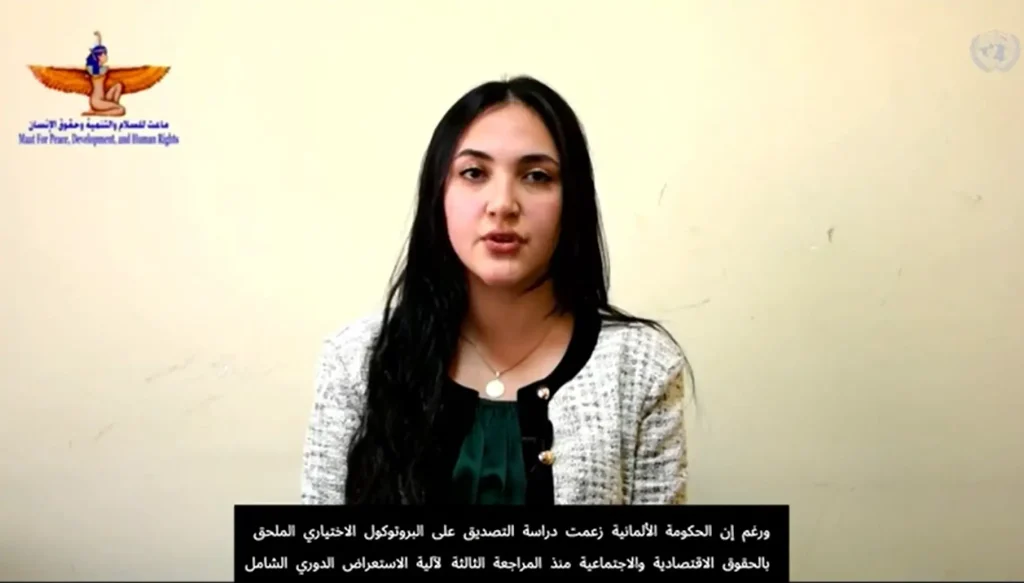Aqeel: The countries that support terrorism must be held accountable before the countries that have been stricken by terrorism are held accountable
Hajar: Turkey is one of the most important sources of water terrorism in the Middle East
Anis: Education is one of the most important tools in fighting terrorism
Shady: Hodeidah city in northern Yemen Suffer from the criminal acts of the Houthi militia
Mujahid: Save the children of Yemen from the crimes of the Houthis
Maat Foundation for Peace, Development and Human Rights held a symposium at the headquarters of the Human Rights Council in Geneva on the sidelines of Maat’s participation in the activities of the 40th session of the Human Rights Council.
The seminar began with an opening speech by the head of the Maat Foundation, in which he emphasized that the Arab citizen is the one who pays the price of terrorism and armed conflicts. Aqeel reviewed some important indicators that confirm the extent of the threat of terrorism to human rights in the Arab region. Especially in light of the economic fatwas within terrorist organizations that allow financing these organizations from theft, fraud, and the trade of organs and slaves.
In his speech, Aqil condemned the countries that grant safe havens and media platforms to terrorist organizations and host on their lands the masterminds of terrorist organizations. Aqeel reviewed a range of violations against children in Yemen, Syria and the Occupied Palestinian Territories due to the interventions of a group of countries such as Turkey, Qatar, Iran and the Israeli occupation forces.
Aqeel concluded his speech with a message addressed to the international community stating, "The first is to question the countries that create terrorism and support it before questioning the countries that have suffered from the fire of terrorism."
Aqil conveyed the word to the speakers at the symposium who represent three different countries, where Hajar Moncef, a specialist in water political relations and director of the African Affairs and Sustainable Development Unit at the Maat Foundation, raised the topic of "water terrorism", which has become one of the most dangerous forms of terrorism in the Middle East region practiced by countries and terrorist organizations that use a source Basic life “water” as a means to achieve its political objectives, whether at the regional or national level. Hajar also spoke about the forms of water terrorism and explained that it is not limited, as some believe, to the lack of water supplies, as the intentional occurrence of flooding is also considered water terrorism because of its destructive effects.
Speaking about the sources of water terrorism in the Middle East, she highlighted that ISIS has launched nearly 20 attacks in addition to the Syrian and Iraqi water infrastructure. Some of these attacks include: floods, threats of drowning, the closing of the dam gates in Fallujah and Ramadi, and the cutting off of water in Mosul, in addition to some claiming that the group poisoned the water in the small towns of Syria. In addition to Turkey, which has built a huge number of dams recently as part of a group of water projects that would supply Turkey with a greater share of the water of the Tigris and Euphrates rivers at the expense of the shares of Syria and Iraq, as Turkey built 22 dams on the Tigris and Euphrates rivers, which extend across Syria And Iraq. The project reduced the flow of water in the river basin by 34 percent and caused 94 percent of Mesopotamia to dry up, leading to an escalation of dust storms in Syria and Iraq and desertification in its southwest and western provinces.
Then Ines Alejo Fernandez, a specialist in international relations in Spain, presented the main practices that lead to the deterioration of the human rights situation, first: the violation of clean environmental rights due to global warming and climate change, which leads to an influx of "environmental migrants". Secondly, the political economic decisions that constitute the sustainable use of land that violate the rights of farmers and rural communities. Anis also referred to the rights of children in light of combating terrorism and clarified the effects of terrorist operations from the violation of children's right to education, health and food.
During the symposium, Shadi Alwan, a member of the Independent Southern Group in Yemen, also spoke about the violations of the Houthi militia in the city of Hodeidah, northern Yemen, then presented via video link from inside Yemen, the activist Mujahid al-Qab, head of the Rased organization, a detailed report issued by the organization on the grave violations committed by the Houthi militia against women, children and civilians in Al-Hodeidah city. The report included detailed statistics on the victims of the mines that the Houthi militia randomly planted in a huge number of minefields in Al Hudaydah Governorate, killing and wounding hundreds of citizens and spreading a state of terror and terror in them, causing disruption to the lives of more than a million citizens who cannot go to their farms and businesses. . He concluded his speech with an urgent appeal in which he appealed to the international community to save the children and women of Yemen, who suffer from the worst kinds of violations.

















